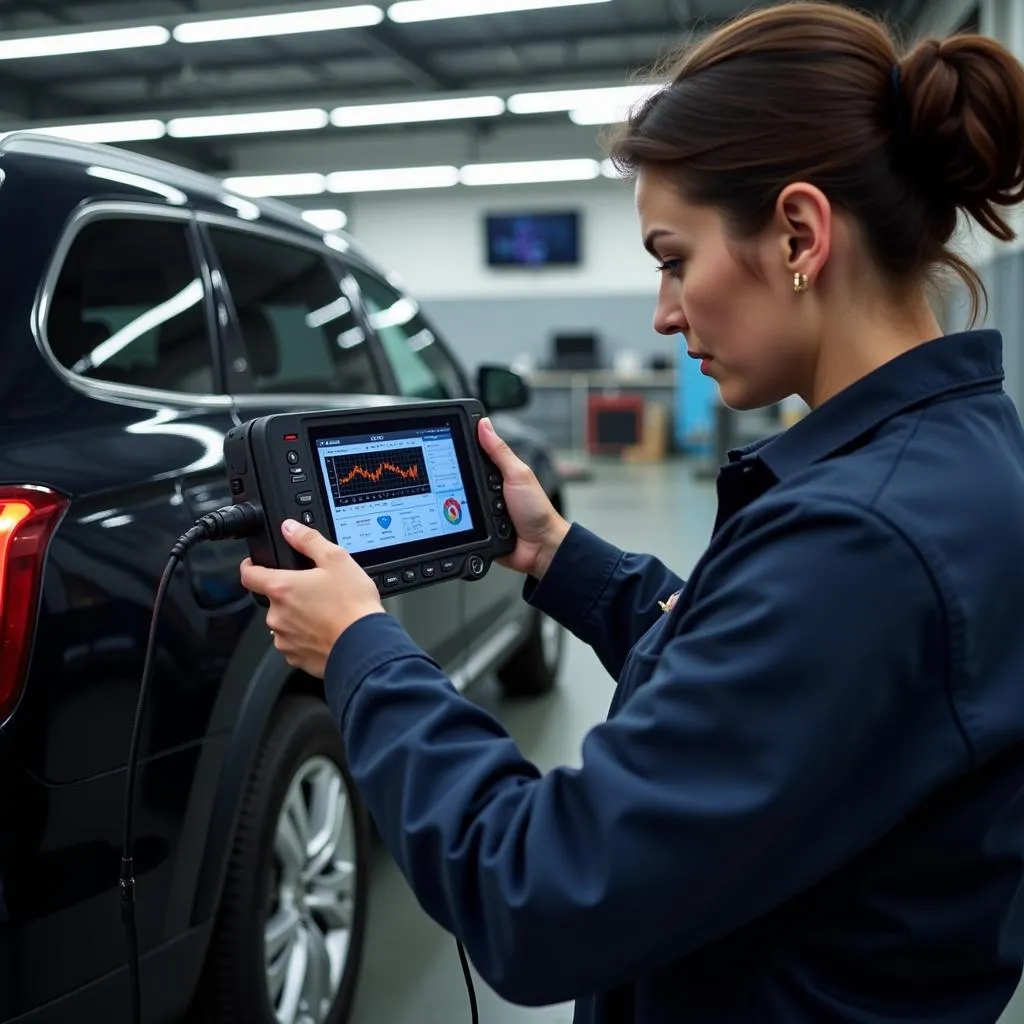Modern vehicles are more technologically advanced than ever, making mechanic electrical tools essential for accurate diagnosis and repair. These tools, ranging from basic multimeters to sophisticated scan tools, empower mechanics to delve into a vehicle’s intricate electrical system, pinpoint faults, and restore optimal functionality.
Understanding the Importance of Mechanic Electrical Tools
 Mechanic Using Diagnostic Tool
Mechanic Using Diagnostic Tool
Mechanic electrical tools have transcended their traditional roles, evolving from simple voltage testers to sophisticated systems capable of interfacing with a vehicle’s computer system. This evolution is directly tied to the increasing complexity of vehicle electronics, encompassing engine control units, transmission control modules, anti-lock braking systems, and a myriad of other electronic components that dictate performance, safety, and comfort.
These tools provide a window into the electronic heart of a vehicle, enabling mechanics to:
- Diagnose Problems Accurately: Electrical problems can be notoriously difficult to pinpoint. Mechanic electrical tools eliminate the guesswork, providing real-time data and fault codes that lead to precise diagnosis.
- Enhance Efficiency: By quickly identifying the root cause of an issue, mechanic electrical tools significantly reduce diagnostic time, leading to faster repairs and increased shop productivity.
- Improve Safety: Modern vehicles rely heavily on electronics for safe operation. Using specialized tools ensures that these systems are functioning correctly, preventing potential hazards on the road.
Essential Mechanic Electrical Tools for Every Workshop
A well-equipped workshop should have a comprehensive set of electrical diagnostic tools to handle a wide range of automotive issues. Some of the essential tools include:
1. Multimeter: The Cornerstone of Electrical Testing
The multimeter remains an indispensable tool for any mechanic working with automotive electrical systems. It measures essential electrical properties such as:
- Voltage: Identifies potential differences in electrical potential energy.
- Current: Measures the flow of electric charge.
- Resistance: Determines the opposition to the flow of electrical current.
- Continuity: Checks for a complete electrical path.
2. Computer Diagnostic Tools: Unlocking the Vehicle’s Brain
Modern vehicles are equipped with onboard computers that monitor and control various systems. Computer diagnostic tools act as the bridge between these computers and the mechanic, allowing them to:
- Read and Clear Fault Codes: Retrieve diagnostic trouble codes (DTCs) stored in the vehicle’s computer, providing valuable insights into potential problems.
- View Live Data Streams: Monitor real-time sensor readings and system parameters, aiding in diagnosis and system analysis.
- Perform Actuator Tests: Command specific actuators (e.g., solenoids, motors) to function, verifying their operation and identifying potential issues.
- Program and Configure Modules: In some cases, these tools can program or configure new modules or components installed in a vehicle.
3. Oscilloscope: Visualizing Electrical Signals
For more complex electrical diagnostics, an oscilloscope is an invaluable tool. It provides a visual representation of electrical signals, allowing mechanics to:
- Analyze Signal Shape: Identify abnormalities in signal patterns, indicating potential issues with sensors, circuits, or components.
- Diagnose Intermittent Problems: Capture and analyze intermittent faults that may not be detected by other tools.
- Test Communication Networks: Diagnose problems with the vehicle’s communication networks, such as CAN bus systems.
Choosing the Right Mechanic Electrical Tools
Selecting the right mechanic electrical tools can be overwhelming given the wide array of options available. Here are key factors to consider:
- Budget: Establish a budget that aligns with your workshop’s needs and the types of vehicles you service.
- Vehicle Coverage: Ensure the tools you choose are compatible with the makes and models you typically work on.
- Functionality: Consider the specific diagnostic capabilities you require, such as code reading, live data, and actuator tests.
- User-Friendliness: Opt for tools with intuitive interfaces, clear displays, and easy-to-use software.
- Brand Reputation: Choose reputable brands known for quality, accuracy, and reliable customer support.
Investing in Your Workshop’s Success
Mechanic electrical tools are indispensable assets for any modern automotive workshop. By equipping yourself with the right tools and knowledge, you can enhance your diagnostic capabilities, improve repair efficiency, and deliver exceptional service to your customers. The automotive industry is constantly evolving, and investing in high-quality mechanic computer diagnostic tools is an investment in your workshop’s future success.
Frequently Asked Questions (FAQs)
What are some basic electrical tools for beginners?
For beginners, essential tools include a multimeter, test light, wire strippers/crimpers, and a soldering iron.
What is the difference between a code reader and a scan tool?
Code readers simply retrieve fault codes, while scan tools offer more advanced features like live data, actuator tests, and module programming.
How often should I update my diagnostic software?
Diagnostic software should be updated regularly, typically annually or as new updates become available, to ensure compatibility with the latest vehicle models and technologies.
Need Expert Assistance with Automotive Diagnostics?
Our team of certified technicians is ready to assist you. Contact us via WhatsApp: +1(641)206-8880, Email: [email protected], or visit our workshop at 276 Reock St, City of Orange, NJ 07050, United States. We’re available 24/7 to answer your questions and provide expert guidance.